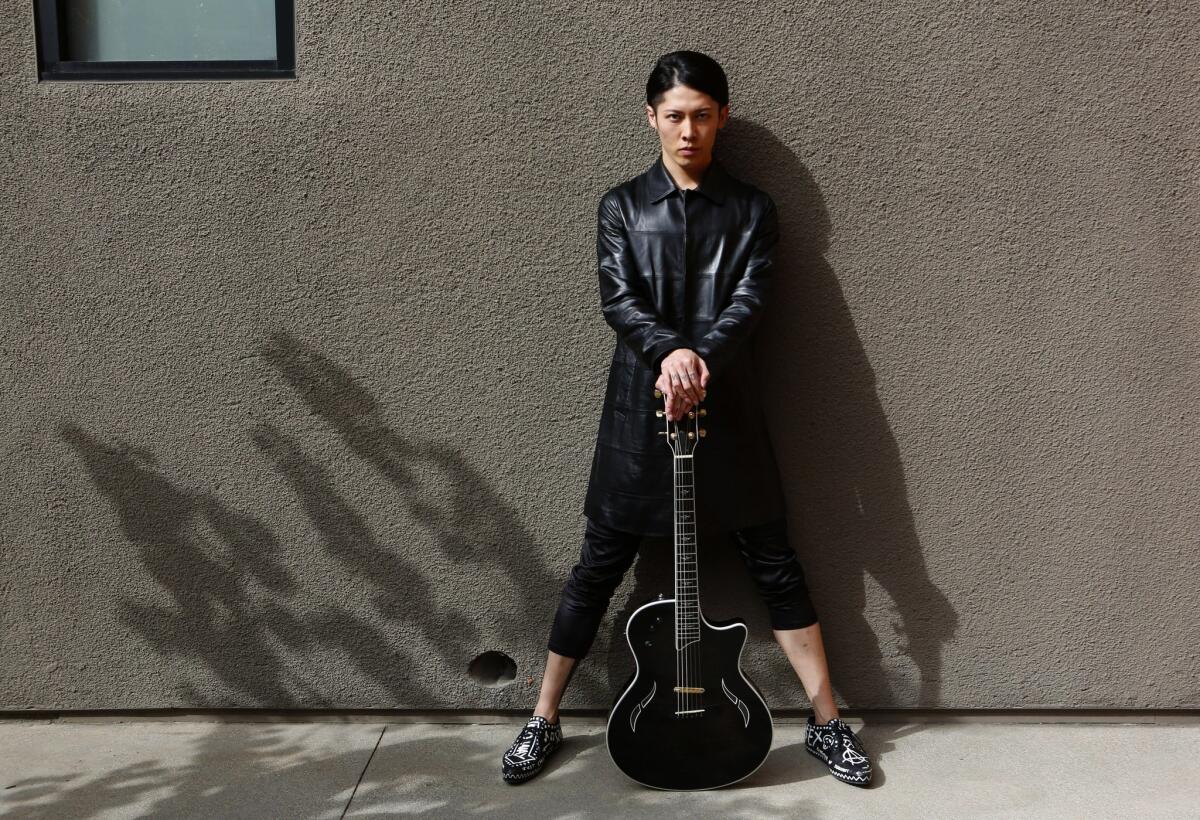Movie Sneaks: Japanese rock singer Miyavi makes debut in ‘Unbroken’

When the Japanese singer-songwriter Miyavi came to Los Angeles for the first time in 2006, he had none of the clichéd rock-star aspirations of breaking into acting. A flashy, high-energy musician known for his unconventional finger-slapping style of guitar playing, he simply wanted to study English to better communicate with his growing fan base outside of Asia.
“The only thing I could say was, ‘Could you speak more slowly please?’” he remembered on a recent afternoon in Pasadena, speaking quietly and deliberately in a language he is working to master. “I never expected I was ever going to be in a Hollywood film as a villain.”
Eight years later, in one of this season’s most improbable breakout performances, Miyavi, 33, is set to make his acting debut in the much-anticipated adaptation of Laura Hillenbrand’s 2010 bestseller “Unbroken,” opening Dec. 25.
In the epic World War II survival tale, directed by Angelina Jolie, he plays the sadistic POW guard Mutsuhiro Watanabe, who was obsessively bent on physically and psychologically torturing American Olympic runner turned war hero Louis Zamperini, played by Jack O’Connell. Though it’s the type of role bound to attract attention, it was a painful one in many ways for the first-time actor.
Jolie cast a wide net to find the right actor to play the pivotal role of Watanabe, nicknamed “The Bird” by his prisoners. She enlisted the help of Japanese casting director Yoko Narahashi, who had cast key roles in such films as “The Last Samurai,” “Babel” and “Memoirs of a Geisha.”
“It was very important to us that this was not going to be a stereotype of a Japanese bad guy, that this was a very complex human being who had a very strong presence,” Jolie said. “We talked a lot about different actors who were out there, but it wasn’t clear there was that one person.”
Miyavi, born Takamasa Ishihara to a Korean father and a Japanese mother, grew up in Osaka with a deep love of soccer. But after an injury ended his hopes of playing professionally, he took up the guitar at age 15 and relocated to Tokyo two years later to pursue a music career, eventually adopting the stage name Miyavi. Even as he found fame as a musician, the thought of acting never crossed his mind, he said: “Never ever ever.”
Still, impressed by the performer’s charisma on stage, Narahashi arranged a meeting with Miyavi, though she didn’t initially reveal her purpose. “She just asked me what kind of films I liked, what kind of actors and actresses I liked,” Miyavi said. “I answered that Angelina Jolie was my favorite actress. The second time she came to my office, she brought the script and she said the director was Angelina Jolie. I was like, Whoa! I felt it was destiny.”
Jolie, in turn, was floored by Miyavi’s audition: “My mouth dropped, and I got so excited I ran around the room trying to show everyone I could possibly find.”
She quickly set about persuading Universal to take a chance on the untested acting novice: “I brought his tape to the studio, and we all sat in a theater, and everybody was absolutely shocked and stunned.”
Before signing on, though, Miyavi had to overcome his reservations about playing a notorious Japanese war criminal, who went into hiding after the conflict and was never prosecuted. (Watanabe eventually became a life insurance salesman and died in 2003.) The history of World War II remains a highly sensitive subject in Japan. Last year, Prime Minister Shinzo Abe’s conservative government initiated a push to inject a more patriotic tone into Japanese school textbooks, many of which largely gloss over the war.
“‘Unbroken’ is not even translated there,” Miyavi said. “It’s pretty controversial. I was thinking, should I try this or not? It was a huge responsibility.”
Ultimately, he decided that the film’s inspirational message about the resilience of the human spirit outweighed any potential criticism he might face.
“In the end, Louis forgave everything and he came back to Japan,” Miyavi said. “He showed his love and his heart to Japanese people. There are negative comments toward this film in Japan from people who only know the book. But I strongly feel they’re going to receive the message from Louis. Louis Zamperini is not an American hero — he’s an international hero.”
On the film’s set in Australia, shooting the intense scenes of emotional and physical abuse exacted a toll on Miyavi, who is a Buddhist.
“You could see that it really bothered him,” Jolie said. “I remember I wanted to show his wife one of the scenes because I thought she’d be so proud of him. She said she’d never seen his face like that, and it shocked her. She doesn’t know that person.”
At times the strain grew difficult for Miyavi to handle. “Toward the end, there was a scene where I had to express my sadness, confusion and anger toward Louis without any lines, only facial expressions,” he recalled. “It is really tough to do that without any experience as an actor. I threw up. It was too much pressure.”
To help maintain the tension between their characters, Miyavi and O’Connell avoided becoming too friendly during the shoot. “We both agreed that a distance would probably be better advised,” O’Connell said. “There are a lot of emotions involved in their dynamic — it’s not just hatred — and I think by keeping a distance, there was a bit of a mystery about the pair of us.”
After filming ended, though, Miyavi — who recently moved to L.A. and plans to explore the next phase of his music career in Nashville — had a chance to meet with the real Louis Zamperini at his home in the Hollywood Hills, not long before his death in July at age 97.
“It was so meaningful that he welcomed me and my wife and my daughters,” Miyavi remembered. “He was talking about his experiences like it was a funny story, even if it was hard, because he was able to get over it. He kept talking, talking, talking. It was a great time.”
More to Read
Only good movies
Get the Indie Focus newsletter, Mark Olsen's weekly guide to the world of cinema.
You may occasionally receive promotional content from the Los Angeles Times.







